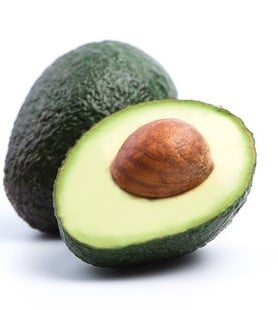

Avocado allergy in dogs can cause skin irritation, excessive itching, redness and swelling, hair loss, and skin lesions. If left untreated, it can also lead to secondary infections like yeast and bacterial infections. Dogs may also experience diarrhea, vomiting, and respiratory distress when exposed to avocados.
The cause of avocado allergies in dogs is an immune response when their bodies mistakenly identify avocado proteins as harmful. When these proteins come into contact with a dog’s skin, digestive tract or respiratory system, the immune system releases histamines which cause an allergic reaction resulting in the aforementioned symptoms.
In order to diagnose an avocado allergy in a dog, a veterinarian will ask for a complete medical history and run skin and blood tests to confirm the presence of an allergic reaction. Tests can also reveal the presence of other conditions which can cause similar symptoms. After the diagnosis has been made, the veterinarian can then recommend a treatment plan that can help alleviate the dog’s symptoms.
Avocado allergy in dogs is serious and can cause very uncomfortable and potentially dangerous symptoms. If left untreated, secondary infections and other complications can arise, and the mortality rate associated with these complications is fairly high. Appropriate treatment and management of symptoms can help to reduce the risks posed by an untreated avocado allergy in dogs.
Avocado allergy in dogs can be treated with antihistamines to reduce itching and inflammation. The affected area should be washed and treated with an antifungal shampoo to help prevent further infection. If secondary infections have developed, your vet may prescribe an antibiotic. When it comes to dietary management, it is important to avoid avocados and any foods that contain avocado oil or extract. Additionally, a veterinarian may recommend a special diet such as hydrolyzed protein diets to help reduce reactions to food allergens.
In order to prevent an avocado allergy from affecting dogs, it is important to make sure that the dog does not consume any parts of the avocado or foods containing avocado. It is also important to ensure that the dog does not come into contact with any parts of the avocado. Any products that have avocado or avocado oil should not be used on the dog’s fur or skin, and the area should be washed thoroughly if any contact has occurred. Furthermore, it is important to read labels on packaged foods or snacks, as many may contain avocado as an ingredient.
Avocado allergies in dogs are not contagious, so it cannot be passed on to humans. However, depending on the severity of the dog’s reaction, the allergens could affect humans who come into contact with the dog. For example, if a person is exposed to a dog’s hair or saliva that contains allergens, they may experience mild skin irritation or difficulty breathing. It is advised to keep humans and pets who have an avocado allergy separate to prevent reactions.
Home remedies for avocado allergies in dogs include feeding them a hypoallergenic diet, providing omega-3 fatty acid supplements, and continuing regular baths with an oatmeal-based shampoo. Additionally, applying an anti-allergy cream to the affected area may help reduce itching and inflammation.
While these home remedies can help reduce symptoms of avocado allergies in dogs, please bear in mind that these are not guaranteed solutions and it is always best to consult a veterinarian for their professional advice.
There are no dog breeds that are particularly prone to avocado allergy, as it is not a common allergy in canines. However, any canine can develop an allergy to avocados. Clinical allergy signs have been reported in some dogs, such as itchiness, vomiting, and irritability when exposed to avocados. It is important for pet owners to watch for signs of allergy in their dogs when feeding them avocados or ingredients that contain them.
Have you ever experienced an avocado allergy in your dog? If so, how did they respond when exposed to avocado? Did they show any signs of itching, skin irritation, redness and swelling, or hair loss? How did you feel and manage the process?
At the end of the day, it’s important to keep your furry friend healthy and safe. If your dog is ever experiencing any type of allergy or discomfort, make sure to consult with a veterinarian. Wishing you and your pup all the best!